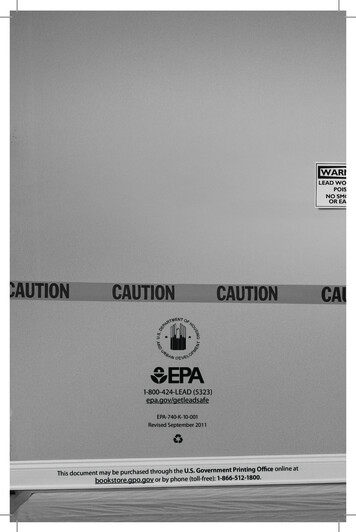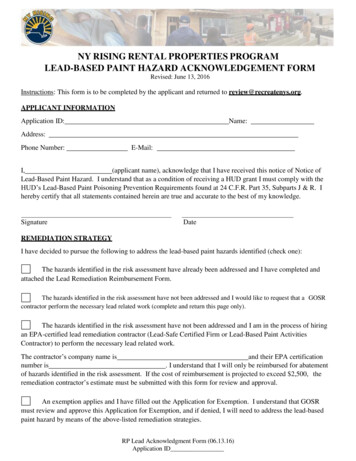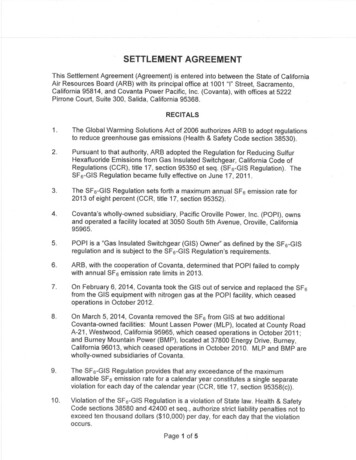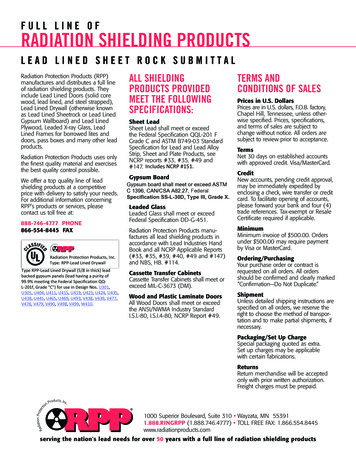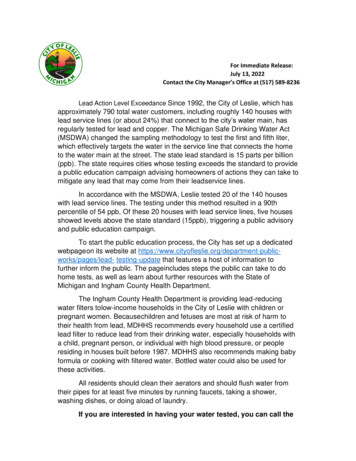
Transcription
For Immediate Release:July 13, 2022Contact the City Manager’s Office at (517) 589-8236Lead Action Level Exceedance Since 1992, the City of Leslie, which hasapproximately 790 total water customers, including roughly 140 houses withlead service lines (or about 24%) that connect to the city’s water main, hasregularly tested for lead and copper. The Michigan Safe Drinking Water Act(MSDWA) changed the sampling methodology to test the first and fifth liter,which effectively targets the water in the service line that connects the hometo the water main at the street. The state lead standard is 15 parts per billion(ppb). The state requires cities whose testing exceeds the standard to providea public education campaign advising homeowners of actions they can take tomitigate any lead that may come from their lead service lines.In accordance with the MSDWA, Leslie tested 20 of the 140 houseswith lead service lines. The testing under this method resulted in a 90thpercentile of 54 ppb, Of these 20 houses with lead service lines, five housesshowed levels above the state standard (15ppb), triggering a public advisoryand public education campaign.To start the public education process, the City has set up a dedicatedwebpage on its website at s/pages/lead- testing-update that features a host of information tofurther inform the public. The pageincludes steps the public can take to dohome tests, as well as learn about further resources with the State ofMichigan and Ingham County Health Department.The Ingham County Health Department is providing lead-reducingwater filters tolow-income households in the City of Leslie with children orpregnant women. Becausechildren and fetuses are most at risk of harm totheir health from lead, MDHHS recommends every household use a certifiedlead filter to reduce lead from their drinking water, especially households witha child, pregnant person, or individual with high blood pressure, or peopleresiding in houses built before 1987. MDHHS also recommends making babyformula or cooking with filtered water. Bottled water could also be used forthese activities.All residents should clean their aerators and should flush water fromtheir pipes for at least five minutes by running faucets, taking a shower,washing dishes, or doing aload of laundry.If you are interested in having your water tested, you can call the
Drinking water hotline to have your water tested at no charge 1- (844)934-1315If a household has a child under 18 years of age or pregnantwoman andreceives WIC benefits, Medicaid insurance, or cannot afforda water filter, theycan receive a free one (filters cost about 35, and their replacementcartridges cost about 15). Filters will be available at City Hall from 8:00A.M. to 4:30 P.M. Please call the office at 517-589-8236 if you need topick up filters outside of these hours. Please let us know if you arehomebound and need filters brought to you.The Michigan Department of Environment, Great Lakes and Energy orEGLE (formally the MDEQ) is the state department that evaluatescompliance with the ActionLevel of all lead and copper results collected ineach round of sampling. More information on their program can be accessedat www.michigan.gov/MILeadSafe.If you are operating a food establishment such as a store, restaurant, bar,or food manufacturing establishment please visit this pagewww.michigan.gov/mdardleadinfo for specific information for food firms.City of Leslie – The Place to Be.Visit the city’s web site at www.cityofleslie.orgIMPORTANT INFORMATION ABOUT LEAD IN YOURDRINKING WATERTHE CITY OF LESLIE HAS EXCEEDED THE ACTION LEVEL FOR LEAD. Lead can causeserioushealth and development problems, especially for pregnant women and young children.Please read thisinformation closely to see what you can do to reduce lead in your drinkingwater.This notice is brought to you by theCity of Leslie.Water Supply SerialNumber: 3840Distribution Date: July 15, 2022.Health Effects of LeadLead can cause serious health and development problems. It can cause damage to the
brain and kidneys and can interfere with the production of red blood cells that carry oxygento all parts of your body. The greatest risk of lead exposure is to infants, young children, andpregnant women. Scientists have linked the effects of lead on the brain with lowered IQ inchildren. Adults with kidney problems andhigh blood pressure can be affected by low levelsof lead more than healthy adults. Lead is stored in the bones, and it can be released later inlife. During pregnancy, the child receives lead from the mother’s bones, which may affectbrain development. Although other sources of lead exposure exist, such as lead paint, andlead contaminated dust, the City of Leslie is contacting you to reduce your risk of exposureto lead in drinking water. If you have questions about other sources of lead exposure, pleasecontact the Ingham County Health Department at (517) 887-4517.Sources of LeadLead is a common metal found in the environment. Drinking water is one possible source oflead exposure due to the widespread use of lead in plumbing materials. EPA estimates thatdrinking water canmake up 20 percent or more of a person’s potential exposure to lead.Infants who consume mostly mixed formula can receive 40 percent to 60 percent of theirexposure to lead from drinking water.The action level is 15 parts per billion (ppb) for lead and 1.3 parts per million (ppm) forcopper. The action level is a measure of corrosion control effectiveness. It is not a healthbased standard. To meet the requirements of the Lead and Copper Rule, 90 percent of thesamples collected must be below theaction level. The following table summarizes the leadand copper data collected during the most recentmonitoring period:Most Recent Sampling Information90th PercentileValueRange of results(Minimum-maximum)# Of samples usedfor 90th PercentileLead 15 parts per billion (ppb)54 ppb0 – 110 ppb20Copper 1.3 parts per million (ppm)0.4 ppm0.0 – 0.4 ppm20Action LevelsLead can enter drinking water when pipes, solder, home/building interior plumbing, fittingsand fixturesthat contain lead corrode. Corrosion is the dissolving, or wearing away, of metalcaused by a chemicalreaction between water and you’re plumbing. Several factors affectthe amount of lead that enters the water, including the water quality characteristics (acidityand alkalinity), the amount of lead in the pipes, plumbing and/or fixtures, and the frequencyof water use in the home.Some plumbing products such as service lines, pipes and fixtures may contain lead. Theinfographic below demonstrates where sources of lead in drinking water could be in your
home. Older homes mayhave more lead unless the service line and/or plumbing has beenreplaced. Homes built. Before the 1960s are more likely to have lead service lines, lead pipes,fixtures, and/orsolder that contain lead. Before 1988 are likely to have fixtures and/or solder that contains lead. Between 1996 and 2014 are likely to have fixtures that contain up to eightpercent leadbut were labelled “lead-free.” In 2014 or later still have potential lead exposure. “Lead free” was redefined toreduce leadcontent to a maximum of 0.25 percent lead in fixtures and fittings.Fixtures that are certified to meet NSF Standard 61 meet this more restrictivedefinition of “lead free.”Leaded solder and leaded fittings and fixtures are still available in stores to use fornon-drinking water applications. Be careful to select the appropriate products forrepairing or replacing drinkingwater plumbing in your home.Galvanized plumbing can be a potential source of lead. Galvanized plumbing can absorblead from upstream sources like a lead service line. Even after the lead service line hasbeen removed, galvanized plumbing can continue to release lead into drinking water overtime. Homes that are servedby a lead service line should consider replacing galvanizedplumbing inside the home.Drinking water is only one source of lead exposure. Other common sources of leadexposure are lead-based paint, and lead-contaminated dust or soil. Because lead can becarried on hands, clothing, and/or shoes, sources of exposure to lead can include theworkplace and certain hobbies. Wash your children’s hands and toys often as they cancome in contact with dirt and dust containing lead. In addition, lead can be found in certaintypes of pottery, pewter, food, and cosmetics. If you have questions about other sources oflead exposure, please contact the Ingham County Health Departmentat (517) 887-4517.Particulate LeadLead results can vary between tests. A single test result is not a reliable indicator of drinkingwater safety. Two different types of lead can be present in drinking water, soluble lead andparticulate lead. Soluble lead is lead that dissolves because of a chemical reaction betweenwater and plumbing that contains lead. Particulate lead is dislodged scale and sedimentreleased into the water from the sides of the plumbing and can vary greatly betweensamples. Disturbances, such as replacing a water meter, construction and excavationactivities, or home plumbing repairs can cause particulates to shake free from inside pipesand plumbing. Particulate lead is a concern because the lead content canbe very high.Lead particulate could be present in a single glass of water, but not present in watersampled just before or after. During construction, monthly aerator cleaning and using a filtercertified toreduce lead are recommended to reduce particulate lead exposure.Check whether your home has a lead service line.Homes with lead service lines have an increased risk of having high lead levels indrinking water.Please contact the City of Leslie for more information about your home’sservice line.Steps You Can Take to Reduce Your Exposure to Lead in Your Water
1. Run your water to flush out lead. The more time water has been sitting in yourhome’s pipes, themore lead it may contain. Therefore, if your water has not been used forseveral hours, run the water before using it for drinking or cooking. This flushes leadcontaining water from the pipes. If you do not have a lead service line, run the water for 30 seconds to twominutes, or until itbecomes cold or reaches a steady temperature. If you do have a lead service line, run the water for at least five minutes to flushwater from boththe interior building plumbing and the lead service line.Additional flushing may be required for homes that have been vacant or have a longerserviceline. Your water utility can help you determine if longer flushing times areneeded.2. Use cold filtered water for drinking and cooking. Do not cook with or drink waterfrom the hotwater tap; lead dissolves more easily into hot water.3. Use cold water for preparing baby formula. Do not use water from the hot watertap to make baby formula. MDHHS recommends using bottled water or a filter certifiedto reduce lead to prepare baby formula.4. Do not boil water to remove lead. Boiling water will not reduce lead levels.5. Everyone can consider using a filter to reduce lead in drinking water. MDHHSrecommends every household use a certified lead filter to reduce lead from their drinkingwater, especially households with a child, pregnant person, or individual with high bloodpressure, or people residing in houses built before 1987.Look for filters that are testedand certified to NSF/ANSIStandard 53 for lead reductionand NSF/ANSI Standard 42 forparticulate reduction (Class I).Some filter options includeapour-through pitcher or faucetmount systems. If the labeldoes not specifically mentionlead reduction, check thePerformance Data Sheetincluded with the device.Be sure to maintain and replace the filter device in accordance with the manufacturer’sinstructions to protect water quality. If your household has a child or pregnant woman andare not able to afford the cost of a lead filter, please contact the Ingham County HealthDepartment (517) 887- 4517.6. Consider purchasing bottled water. The Food and Drug Administration(FDA) regulatesbottled water. The bottled water standard for lead is 5 ppb.7. Get your child tested. Contact your local health department or healthcare provider tofind out howyou can get your child tested for lead if you are concerned about exposure.Please call the Ingham County Health Department at (517) 887-4517.
8. Identify older plumbing fixtures that likely contain lead. Older faucets, fittings, andvalves sold before 2014 may contain higher levels of lead, even if marked “lead-free.”Faucets, fittings, and valvessold after January 2014 are required to meet a more restrictive“lead-free” definition but may still contain up to 0.25 percent lead. When purchasing newplumbing materials, it is important to look for materials that are certified to meet NSFstandard 61. The EPA prepared a brochure that explains the various markings that canindicate that materials meet the new “lead free” key P100LVYK.txt.9. Clean your aerator. The aerator on the end of your faucet is a screen that will catchdebris. This debris could include particulate lead. The aerator should be removed at leastevery six months to rinseout any debris.10. Test your water for lead. Call us at (517) 589-8236 to find out how to get yourwater tested forlead. To have your drinking water tested for lead, you can contactEGLE for a list of laboratories certified for lead and copper testing or visit their websiteat www.michigan.gov/EGLElab.What Happened? What is Being Done?The state-wide testing criteria for lead and copper for the State of Michigan changed in2018. Two samples (a 1st liter and 5th liter) are required from each testing location that hasa lead service line. The City of Leslie does have lead packed joints in some of its mainsand service lines. Lead can enterdrinking water when it is in contact with pipes, solder, home/building interior plumbing,fittings and fixtures that contain lead. The City of Leslie does employ corrosion controltreatment to reduce leadleaching. The City has updated its corrosion treatment to focuson corrosion control and reduce Lead leaching into the water.The City is in the process of inventorying all service lines that connect from the maindirectly to a residence or business within the City’s water system to enable us to identifylines that we suspect maycontain lead. The City has developed a plan to actively pursuereplacing lead service lines throughout the city. This work will be accomplished through thefollowing initiatives:1. In conjunction with street construction and/or isolated water main replacementsprojects.2. Planned replacements at locations that exceed action level parameters, andwhere lead orgalvanized water service lines exist.3. Effective 2021, the State mandates Michigan communities to replace Lead ServiceLines (LSL)at an average of 5% of the total number identified per year until 100%.4. Leslie had replaced 17 service lines in 2020, 16 service lines in 2021, and currentlyhave replace 5 service lines in 2022.Every year the City of Leslie conducts testing of tap water in homes for lead andcopper. In September, we collected samples from twenty (20) homes. Five (5) homeswere above theAction level for lead.If you are a City of Leslie water customer and would like your service line inspected orwould like to have your drinking water tested for lead, contact the Department of Public
Works at (517) 589-5115. The City will be providing testing and filters for any home with alead or galvanized service line and lead levels over 15 parts per billion. If your householdhas a child or pregnant woman and are not ableto afford the cost of a lead filter, pleasecontact the Ingham County Health Department at (517) 887- 4517.For More InformationCall us at (517) 589-8236 or visit our website at https://www.cityofleslie.org/departmentpublic- works/pages/lead-testing-update or www.michigan.gov/MiLeadSafe. For moreinformation on reducing lead exposure around your home/building and the health effects oflead, visit EPA’s Web siteat www.epa.gov/lead, call the National Lead Information Centerat 800-424-LEAD, or contact your healthcare provider.
Is it OK to use lead-containing water to wash my hands?Yes! Human skin does not easily absorb lead from water.Even if you have lead in yourdrinking water, you can washyour hands with water that is notfiltered or flushed.Public Health advises residents towash hands often and for at least20 seconds with soap and water tohelp prevent the spread ofcoronavirus (COVID-19).You can use water that has notbeen filtered or flushed for:o Showering or bathing (avoidswallowing the water)o Washing hands, dishes, orclotheso CleaningTo learn more please visit, Michigan.gov/coronavirus or Michigan.gov/MiLeadSafe
For Immediate Release: July 13, 2022 Contact the City Manager's Office at (517) 589-8236 Lead Action Level Exceedance Since 1992, the City of Leslie, which has approximately 790 total water customers, including roughly 140 houses with

